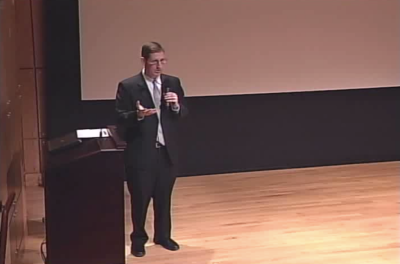News & Features
Newsletters | YIVO in the Media | Press Releases

Di gantse velt af a firmeblank: The World of Jewish Letterheads
Assemble the letterheads of Jewish organizations, institutions, and individuals in Europe, North and South America, and Palestine from the 1890s to the eve of World War II in 1939 and you have a portrait of the Jewish world: transnational; diverse in language, political, and religious orientation; and flourishing.
Di gantse velt af a firmeblank (The Whole World on a Letterhead) is an experiment in building that portrait. Here, we hope to bring you several times a month, a different example of letterhead from a single collection in the YIVO Archives, the Papers of Kalman Marmor.

Arieh Tartakower on the Differences Between Hebrew and Yiddish Culture (1967)
In this episode from January 8, 1967, Dr. Arieh Tartakower, sociologist and chairman of the Israeli Division of the World Jewish Congress and president of the World Hebrew Confederation delivers a speech on the differences between Hebrew and Yiddish culture, during a visit to YIVO on December 27, 1966: "We are ...


Adelebsen: The Records of a Jewish Community in Germany (YIVO Archives, Record Group 244)
by VIOLET LUTZ
Of the many interesting materials that I've encountered in the YIVO archival collections that I have had the honor and pleasure of processing as an archivist at the Center for Jewish History, I am struck sometimes by particular items that offer insights into everyday life in a particular time and place. The Adelebsen Jewish community records held by YIVO, dating from 1830 to 1917, contain remarkable traces of the evolving Jewish communal life in the small German town of Adelebsen, in the district of Göttingen, in what is today the state of Lower Saxony. The region was historically part of the kingdom of Hanover. (The latter was annexed by the kingdom of Prussia in 1866; and subsequently became part of the German Empire, founded under Prussia's leadership in 1871.)

Di gantse velt af a firmeblank: The World of Jewish Letterheads
Assemble the letterheads of Jewish organizations, institutions, and individuals in Europe, North and South America, and Palestine from the 1890s to the eve of World War II in 1939 and you have a portrait of the Jewish world: transnational; diverse in language, political, and religious orientation; and flourishing.
Di gantse velt af a firmeblank (The Whole World on a Letterhead) is an experiment in building that portrait. Here, we hope to bring you several times a month, a different example of letterhead from a single collection in the YIVO Archives, the Papers of Kalman Marmor.

Agricultural Life in Israel: A Paper from the 40th YIVO Conference (1966)
This episode, originally broadcast on May 22, 1966, features Dr. Shimshon Tapuach of the Department of Agriculture, Jewish Agency, Tel Aviv. By then an Israeli, Dr. Tapuach (whose last name, fittingly enough, means “apple” in Hebrew), spent part of his early academic career at YIVO in Vilna in the 1930s, ...

YIVO Institute Honors Theodore Bikel
Two legends come together at the YIVO Institute for Jewish Research’s 13th Annual Heritage Gala: Theodore Bikel and Sholem Aleichem. Theodore Bikel – world-renowned actor, singer, author, and activist – was honored with YIVO’s Lifetime Achievement Award for his commitment to popularizing Yiddish culture. YIVO also announced the creation of the Sholem Aleichem Family Legacy Collection donated in memory of Bel Kaufman, Sholem Aleichem’s granddaughter, by her children, Thea and Jon Goldstine. The collection includes rare family treasures.

2015 Jan Karski & Pola Nirenska Prize
The Award Committee of the Jan Karski and Pola Nirenska Award is pleased to announce that Prof. Jerzy Malinowski has been named the recipient of this year's prize. Endowed by Prof. Jan Karski at the YIVO Institute for Jewish Research in 1992, the $5,000 prize goes to authors of published ...

A Night at Lewando’s: The Book Launch of The Vilna Vegetarian Cookbook
In 1938, Fania Lewando, the proprietor of a popular vegetarian restaurant in Vilna, published a Yiddish vegetarian cookbook including 400 recipes, impassioned essays about the benefits of vegetarianism, and lush full-color drawings of vegetables and fruit. Enchanted by the book, YIVO commissioned a translation, making Lewando's charming, delicious, and practical ...

From Destruction to Rebirth: Jewish Displaced Persons After the Shoah
On April 15, 2015, YIVO sponsored a special Yom HaShoah program featuring Professor Avinoam J. Patt of the University of Hartford, who spoke about the era immediately following the Holocaust, the 1940s, when thousands of Jewish survivors (known as the She’erit Hapletah, or “Surviving Remnant”) were trying to build new lives for themselves, even as they remained in limbo, in displaced persons camps in Germany, Austria, and Italy.
By 1947, 250,000 survivors lived in displaced persons camps in Germany. Professor Patt, with the aid of photographs and artifacts from YIVO’s Archives and Library, detailed the ways in which they created a remarkably dynamic society that included a flourishing press, theater, Zionist youth movements, athletic clubs, historical commissions, yeshivas, and a fiercely independent political system.
The program included a memorial ceremony with the onstage participation of survivors and children of survivors.